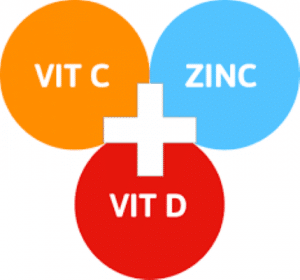
Can Supplements Fight Covid-19?
People have long turned to vitamins to try to protect themselves from disease. Three supplements that are getting a lot of attention around Covid-19 are vitamin D, zinc, and vitamin C. Here’s what scientists currently know about them.
Vitamin D, “the sunshine vitamin”, is one of the most heavily studied supplements. Our bodies make it naturally in the presence of ultraviolet light, and it is also found in foods like fish and fortified milk products. It is a building block of hormones and helps strengthen the immune system. Risk of deficiency is highest during dark winters at high latitudes and among people with darker skin, as the skin pigment melanin inhibits production of vitamin D.
A 2017 meta-analysis suggested that a daily vitamin D supplement might help prevent respiratory infections, particularly in people who are deficient in this vitamin. I recommend 5,000 IU daily to most patients.
Zinc is a mineral that plays several supportive roles in the immune system and helps with cell division and growth. It found naturally in certain meats, beans, and oysters. Studies of using zinc for colds, which are frequently caused by coronaviruses, suggest that using the supplement at the onset of symptoms might make them go away more quickly.
German researchers cite evidence that zinc might theoretically help prevent the new coronavirus from entering the body, as well as help slow the virus’s replication when it does. Studies suggest that giving zinc reduces the risk of death from a pneumonia infection. Among 249 patients studied in a Barcelona hospital last year, those who survived Covid-19 had higher zinc levels in their blood plasma than those who died.
Researchers have found that people with type A blood are more likely to end up on a ventilator during hospitalization when compared to the other blood types. In testing patients’ zinc levels over the years, I have found consistently that those with type A blood tend to be very low in zinc, and I recommend that they take at least 100mg of zinc picolinate. For most other patients I recommend 50mg. It is important to take this on an empty stomach. One out of five people will notice stomach irritation, in which case it is best to take with food. But keep in mind that phytates found in whole grains, fruits, and vegetables, and calcium in dairy will inhibit absorption.
Vitamin C is a potent antioxidant that’s important for a healthy immune system and preventing inflammation. A review published last year noted that human studies found a lower incidence of pneumonia among people taking vitamin C, which suggests that it might prevent the susceptibility to lower respiratory tract infections. A recently published review concluded that vitamin C may help prevent Covid-19 infection and lower the dangerous inflammatory reaction that can cause severe symptoms, based on what is known about how the nutrient works in the body. At Renaissance Health Centre, we have found that high dose vitamin C intravenously is often beneficial in aborting a viral infection.
Terry Pfau DO, HMD
